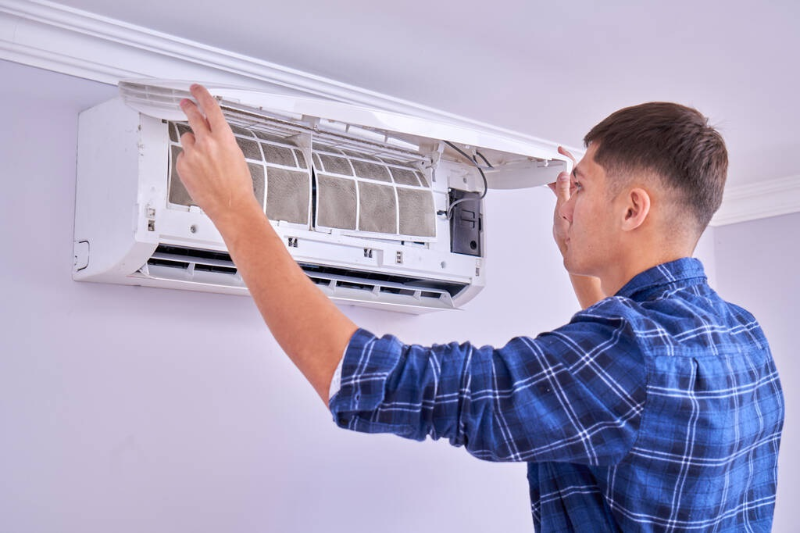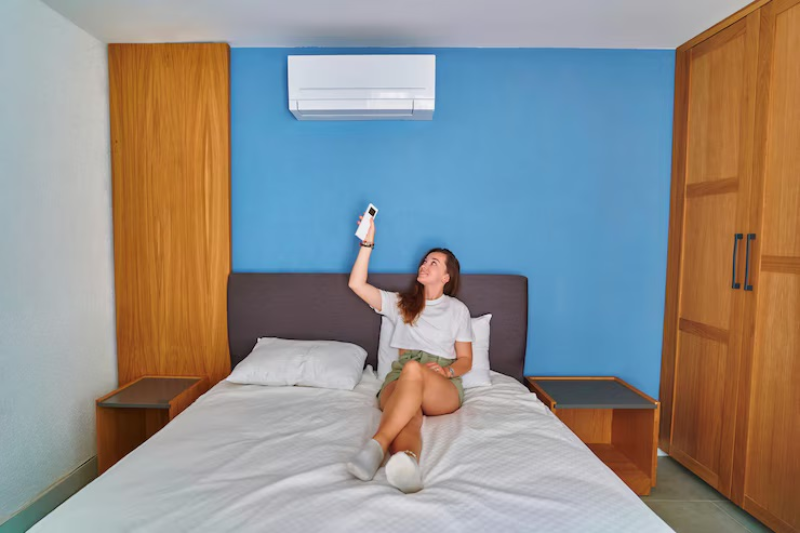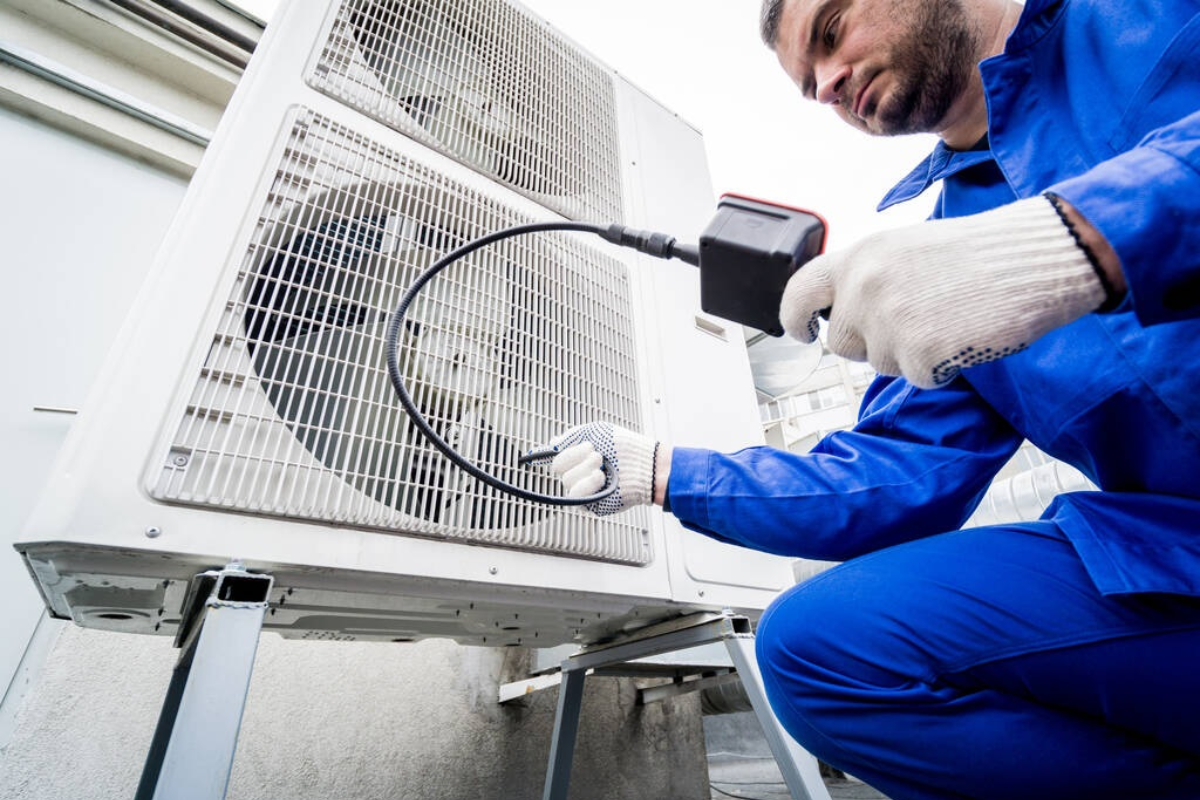Table Of Contents
Sleep is a rudimentary aspect of our health and well-being, impacting everything from our mood to our cognitive function. However, achieving a restful night's sleep can sometimes be elusive, with various factors such as temperature, humidity, noise, and air quality affecting our ability to sleep deeply and wake up refreshed.
This article will investigate how air conditioning systems are crucial in creating optimal sleep environments and improving sleep quality. Read on to learn more!
Understanding sleep quality
Quality sleep is characterised by uninterrupted periods of rest that allow our bodies and minds to recharge effectively. Factors such as sleep duration, depth of sleep stages, and the absence of disturbances contribute to overall sleep quality. Creating an atmosphere conducive to quality sleep involves managing temperature, humidity, noise levels, and air quality variables.

The relationship between temperature and sleep
Temperature plays a significant role in regulating our sleep-wake cycles and overall sleep quality. The body's internal temperature naturally decreases during sleep to promote relaxation and facilitate sleep onset.
Air conditioning systems help maintain optimal sleeping temperatures by cooling during warmer months and regulating indoor temperatures to prevent discomfort and sleep disturbances.
Humidity control and sleep
Humidity levels can also impact sleep quality, with high humidity leading to discomfort and increased susceptibility to allergens and respiratory issues. Air conditioning systems with humidity control features help maintain balanced indoor humidity levels, creating a more comfortable sleeping environment and reducing the risk of sleep disruptions caused by excessive moisture.
Noise reduction
A quiet sleeping environment is essential for achieving deep and restorative sleep. External noises from traffic, neighbours, or appliances can disrupt sleep patterns and prevent individuals from reaching deeper sleep stages. Air conditioning systems can reduce noise by providing white noise or operating quietly, creating a more tranquil environment conducive to quality sleep.
Air quality and sleep
Indoor air quality can significantly impact sleep quality, with pollutants such as dust, allergens, and volatile organic compounds (VOCs) triggering allergic reactions and respiratory issues.
Air conditioning systems with advanced filtration and ventilation capabilities help remove airborne contaminants, ensuring cleaner indoor air and promoting healthier sleep environments.
Tips for optimising air conditioning for better sleep
To maximise the sleep-enhancing benefits of air conditioning systems, consider the following tips:
- Set your thermostat to a relaxing temperature between 15 to 21 degrees Celsius for optimal slumber conditions.
- Use programmable thermostats to alter temperature settings according to your sleep schedule, ensuring a relaxed and comfortable environment when it's time to rest.
- Uphold proper humidity levels between 30% and 50% to prevent dryness or excessive moisture that can disrupt sleep.
- Choose air conditioning systems with quiet operation modes or sound insulation features to minimise noise disturbances during sleep.
- Regularly clean or substitute air filters to improve indoor air quality and diminish allergens and pollutants.
Managing temperature fluctuations during sleep
While falling asleep, our body temperature naturally drops to initiate the sleep cycle. However, as the night progresses, temperature fluctuations can occur, potentially disrupting our sleep.
Air conditioning systems equipped with programmable thermostats can help maintain a consistent sleeping environment by adjusting temperatures automatically according to your sleep schedule. This ensures you remain comfortable throughout the night, promoting uninterrupted sleep and better sleep quality.
The importance of proper ventilation
In addition to temperature regulation, proper ventilation is essential for creating a healthy sleep environment. Poor ventilation can lead to stale air, trapping pollutants and allergens indoors, adversely affecting respiratory health and disrupting sleep.
Air conditioning systems with efficient ventilation systems help circulate fresh air throughout the room, reducing the concentration of indoor pollutants and promoting better air quality for restful sleep.
Choosing the right air conditioning system
When selecting an air conditioning system for your bedroom, consider factors such as size, efficiency, and features that cater to your specific sleep needs. Split-system air conditioners offer quiet operation and precise temperature control, making them ideal for bedrooms. Additionally, units with advanced filtration systems, such as HEPA or electrostatic filters, effectively remove airborne particles and allergens, further enhancing sleep quality.

Addressing common sleep disturbances with ACs
Certain sleep disturbances, such as night sweats or hot flashes, can significantly impact sleep quality, especially during warmer months. Air conditioning systems provide relief by cooling the room and regulating body temperature, helping individuals experiencing these symptoms achieve more comfortable and restful sleep. Additionally, air conditioning can alleviate discomfort caused by allergies or respiratory conditions, improving sleep quality and overall well-being.
Creating a sleep-friendly environment
In addition to air conditioning, several other factors contribute to creating a sleep-friendly environment:
- Invest in blackout curtains or blinds to intercept external light, promoting more profound and more restful sleep.
- Choose a relaxing mattress and pillows that provide adequate support and alignment for your body, reducing the risk of discomfort and sleep disruptions.
- Minimise electronic devices in the bedroom, as the blue light radiated from screens can interfere with the body's natural sleep-wake cycle and inhibit melatonin production.
- Appoint a soothing bedtime routine to signal your body that it's time to wind down and prepare for sleep. This may include activities such as reading, meditation, or gentle stretching.
The role of AC in promoting overall health
Beyond improving sleep quality, air conditioning systems offer various health benefits:
- Regulating indoor temperatures can prevent heat-related illnesses during hot weather and relieve individuals with specific medical needs, such as asthma or chronic obstructive pulmonary disease (COPD).
- Maintaining optimal humidity levels, particularly in humid climates, helps prevent mould growth and reduce the risk of respiratory infections.
- Filtering indoor air removes allergens and pollutants, reducing the likelihood of allergic responses and respiratory issues.

Incorporating AC into a holistic approach to wellness
Optimising sleep quality is just one aspect of a holistic approach to wellness that includes nutrition, exercise, stress management, and self-care. By prioritising sleep hygiene and creating a comfortable sleeping environment with the help of air conditioning systems, individuals can enhance their overall quality of life and well-being. Remember that consistency is critical, so aim to show healthy sleep habits and maintain them over time for long-term benefits.
The impact of air conditioning on sleep disorders
Air conditioning systems can also significantly manage certain sleep disorders, like insomnia, sleep apnea, and restless leg syndrome (RLS). These disorders can disrupt sleep patterns and lead to poor sleep quality, resulting in daytime fatigue and impaired cognitive function.
For individuals with insomnia, air conditioning can help create a comfortable sleep environment by regulating temperature and reducing environmental factors that may contribute to sleep disturbances. Maintaining a cool and quiet bedroom promotes relaxation and can aid in sleeping faster and staying longer.
Similarly, air conditioning can benefit individuals with sleep apnea, a condition marked by breaks in breathing during sleep due to airway obstruction. Cool air from air conditioning can help diminish inflammation and congestion in the nasal passageways and throat, improving airflow and reducing the severity of sleep apnea symptoms.
Restless leg syndrome (RLS) is another sleep disorder that can be alleviated with air conditioning. RLS causes irritated sensations in the legs, often escorted by an uncontrollable urge to move them, particularly at night. Cool temperatures can help soothe the discomfort associated with RLS, allowing affected individuals to experience more restful sleep without disruptions.
Importance of a consistent sleep environment
Moreover, air conditioning promotes a consistent sleep environment, essential for individuals with sleep disorders who may be more sensitive to temperature, humidity, or noise changes. By maintaining optimal sleeping conditions, air conditioning systems can complement other sleep disorder treatments and improve sleep quality and daytime functioning.
The importance of regular AC maintenance

To ensure optimal performance and efficiency, it's crucial to schedule periodic upkeep for your air conditioning system. Routine maintenance tasks include:
- Cleaning or replacing air filters.
- Inspecting ductwork for leaks or obstructions.
- Checking refrigerant levels.
- Lubricating moving parts.
Note: Maintaining your air conditioning system well can prolong its lifespan, prevent costly repairs, and allow you to continue enjoying improved sleep quality.
Professional advice can improve your comfort
Air conditioning systems are vital in creating optimal sleep environments and improving sleep quality. By regulating temperature, humidity, noise, and air quality, they help create comfortable sleeping environments that promote relaxation and restful sleep.
Whether you're looking to enhance sleep quality, manage sleep disorders, or simply create a more comfortable living space, investing in a quality air conditioning system is a valuable step towards improving overall well-being.
Remember to prioritise regular and professional maintenance to guarantee your air conditioning system continues to work efficiently and effectively. With the right combination of sleep hygiene practices and a well-maintained air conditioning system, you can enjoy adequate sleep and wake up refreshed and revitalised daily.




